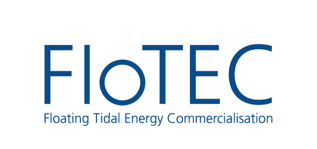FloTEC

The Floating Tidal Energy Commercialisation (FloTEC) project, led by Orbital Marine Power, has been recognised by the EC’s Horizon2020 programme for its ability to demonstrate how floating tidal systems can provide low-cost, high-value energy to the European grid mix.
The project will build on Orbital’s existing two-megawatt floating tidal technology, the SR2000 – the world’s most powerful tidal turbine. The aim is to demonstrate an advanced, full-scale device in real conditions with high levels of reliability and survivability while developing a greater understanding of factors such as installation, operation and decommissioning costs.
Orbital O2 2MW
The Orbital O2 2MW demonstrator will feature a number of innovations, including 35 percent greater energy capture through enlarged rotors with a lower rated speed, full onsite access to all turbine systems through an optimised platform configuration, high performance blades, compatibility with local supply chain and infrastructure and mooring load dampers.
There will also be a strong focus on reducing the levelised cost of energy, through considerable capital and operational cost reductions at every stage of the Orbital O2’s design, build and operation. SKF’s technologies will play a significant role in cutting the cost of tidal energy through enhanced performance and efficiency.
The O2 project has received funding from the European Union’s Horizon 2020 research and innovation programme under the FloTEC project (grant agreement No. 691916) and the European Regional Development Fund through the Interreg North West Europe Programme under the ITEG project.

SR2000
The project, which is funded through the European Commission’s Horizon2020 programme, brings together Orbital’s core supply chain and strategic partners to deliver a future-proofed product solution with a much reduced and financeable risk profile.
Project partners are ABB UK, Technology from Ideas, Eirecomposites, University College Galway, University College Cork, DP Energy, EDF Energy, SKF and EMEC.
The project is in the preproduction stage, with the Orbital O2 due for installation at the European Marine Energy Centre, Orkney in early 2021.
